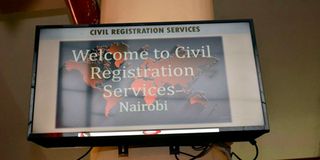
A welcome signage at the Department of Civil Registration.
A court has dismissed a case filed by a man seeking to have his name struck from his former wife’s national identification card and her two children’s birth certificates.
High Court judge Rhoda Rutto ruled that the court does not have the powers to order the Registrar of Births and Deaths to delete the man’s name from the ex-wife’s ID and minors’ birth certificates.
“The applicant has invoked sections 12 and 28 of the Births and Death Registration Act. These provisions do not give this court the mandate to issue the prayers sought. The mandate to undertake corrections is bestowed upon the Registrar,” said Justice Rutto.
As such, she stated, by granting the orders the court would be usurping the mandate of the Registrar, who despite being mentioned as a party in the case was not served with the pleadings.
In his application, the man codenamed JMM said he met the ex-lover, codenamed CMM, in 2013 and they began cohabiting. He had one child from a previous marriage while the woman had two.
He stated that he voluntarily agreed out of love for the woman to include his name in her national identification card resulting in the change of her name to CMM having adopted his name.
Similarly, he consented to his name being entered in the birth certificates of her two children, who she got in her previous relationship. The minors’ birth certificates were issued in January 2024 by the Civil Registry Department of Births and Deaths in Machakos.
The court heard that the relationship took a dramatic turn when the woman allegedly became violent towards the man’s daughter whom he had sired in his previous marriage. He said that upon confronting her, she became abusive and physically
attacked him, forcing him to flee.
When he returned home he found the woman had fled with her children and the attempts to resolve the dispute through her parents proved futile.
It was stated that the ex-lover started threatening any woman the man would try to engage with, on the grounds that they were still legally married.
He argued that her resistance was being buttressed by the fact that the ex-lover and her children bear his name in the national identity card and birth certificates, respectively.
He pleaded with court to issue an order compelling the Registrar to delete his name from the woman’s national ID card and her children’s birth certificates to enable him to move on with his life.
The woman did not file a response to the application. JMM insisted that he neither formally married her nor sired the two children in question.
Justice Rutto, however, threw out the case saying it lacked merit since JMM did not demonstrate any effort or attempt to engage the Registrar in implementing his wishes.
“Moving the court before first seeking an administrative intervention from the Registrar constitutes an abuse of the court process. The applicant was required to first exhaust the administrative internal processes provided for by the Registrar before approaching the court,” said the judge.
By bypassing these steps, the judge said, the man was attempting to circumvent due process.
“Needless to add, it is established that any proceedings against the government should be instituted in the name of the Attorney-General, as the legal advisor and representative on behalf of the government and its entities in civil proceedings such as this,” she ruled.
The court noted that the man by his own admission confirmed that he agreed to have his name included in the ex-lover’s identity card and birth certificates of the minors.
The man had premised his application in court on the provisions of Section 12 of Births and Death Registration Act, which provides for entry of father’s name in the register.
It states: “No person shall be entered in the register as the father of any child except either at the joint request of the father and mother or upon the production to the registrar of such evidence as he may require that the father and mother were married according to law or, in accordance with some recognised custom.”
He had also cited section 28 of the Act, which provides for correction of errors in registers.
It says: “The Principal Registrar may, subject to the rules, and on payment of the prescribed fee (which he may in his discretion in any particular case remit), correct any error or omission in any register…..”









